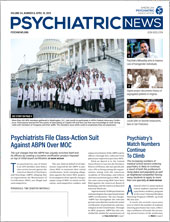One of the true pleasures of the past year as your president has been visiting a number of APA’s district branches and speaking to groups of members. For the most part, I was invited to speak at annual meetings and awards dinners and participate in CME activities, but whatever the occasion, it was always a treat—I am very much a people person and enjoy the “meet and greet” that is such a big part of the job of APA president.
Although I wasn’t able to visit with all of you during my presidency, there were two characteristics that I found consistently as I traveled throughout the country: APA members are working hard to care for our patients, advocate on their behalf, and keep the profession strong, and APA members are not shy about sharing their thoughts about how APA is handling their concerns. Members have asked me questions about APA’s position on a wide range of issues—Maintenance of Certification, impact of climate change on mental health and well-being, lack of full parity, the future of our field in the face of changing regulations, the social determinants of mental health, the impact of violence and public unrest on overall health and well-being, to name just a few.
Hearing from so many members about these issues and learning about the diversity of members’ professional needs and interests have been not only educational but also, more importantly, vital to guiding APA’s agenda at the national level. I was very impressed to see, however, that members are not sitting on the sidelines: they are working at the district branch level to address many of these same tough issues and making their case every day in state houses around the country to educate legislators and policymakers about the great need for psychiatric services. They are building coalitions with other medical professionals and mental health advocates to get the job done.
The lesson? All politics is local, and that includes health care issues. If you have not been active in your district branch yet, consider this as a presidential invitation to do so. To paraphrase a thought from an earlier column, district branches are the “room where it starts.” They are the building blocks of APA.
As I get ready to step down from the presidency next month, I want to send my heartfelt thanks to the many members who are working hard in the trenches to achieve APA’s vision, mission, and values. Continue to be the voice and conscience of modern psychiatry, and reach out to colleagues who are less involved. With a little encouragement, they might just join us in making the future we want to see. ■

